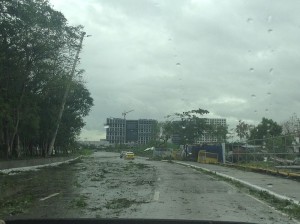Breaking
‘Glenda’ leaves 55,000 homeless Albayanos
LEGAZPI CITY — Albay province was heavily affected by typhoon “Glenda” (internationally known as Rammasun) last July 14-15, and suffered severe damage with wind force of 140-180 kph that lingered over the entire swathe of Albay landmass, Burias Pass, and Albay Gulf for almost seven hours.
Despite this hazard, the province was able to achieve zero casualty through its pre-emptive evacuation strategy benefitting 100,936 families or 711,490 individuals.
Though the province has achieved zero casualty unfortunately Albay suffered massive damages specifically on agricultural crops wherein 9.
4 million of coconut trees with an estimated output loss of P1.3 billion.
Around 54,339 houses made out of light materials worth P1,640,170,000 were flattened to the ground.
Damage to public infrastructure was recorded at P670 million, while P540 million in other infrastructure and P620 million in telecom infrastructure — for a total of P6,107,462,295 based on the recent report from Albay Public Safety Management and Emergency Office (Apsemo) here.
Majority of houses made out of light materials and built within the slum areas of this city either flattened to the ground or gobbled up by thick sands that pile-up during the height of typhoon “Glenda” due to storm surges.
For a week now, Aldrin Bangate, 49, father of a three-year-old girl, is almost recapturing his home again from seven to eight feet high of black sand that piled-up his abode due to storm surges brought by typhoon “Glenda” last week here.
Using only shovel, Aldrin is indefatigably removing the big volume of sands that smashed into his home and to numerous houses built within the shoreline of Sabang, Pigcale, Baybay and San Roque villages here.
“This is very tiring for me but I have to dig out my home as this is our haven that needs to be salvage after the storm. But if, I’m capable enough to buy a land, I will build a safer home for my family not in this coastal area where weather is the constant threats specifically that typhoons area getting stronger nowadays,” Aldrin said.
Aldrin’s wife, Fe, 48, is still recuperating from the injury after she incidentally stride out a sharp object on their way home from temporary shelter provided by the government for safety.
Albay Governor Joey Salceda, UNFCCC Green Climate Fund co-chair for Developing Countries, said the fight against climate change, its causes and effects will trigger higher poverty and higher malnutrition.
Seven years ago, Salceda said that typhoon “Durian” took away 1,500 lives and 45 percent of the underlying economy of Albay province.
“Since then, we invested 9-11 percent of our annual budget to keep people safe in the midst of the risks and make development resilient to disasters and to climate change. In six years, we increased our forest cover by 88 percent and our mangroves 4x from 700 hectares to 2,100 hectares while achieving all MDG indicators much earlier in 2011,” he noted.
“In 2013, we all witnessed the devastation of “Yolanda” in our southern neighbours. However, on July 14-15, the climate evil was at our doorsteps — Typhoon “Glenda” made a landfall in Albay, lingered for eight days with winds of 150-180 kph,” Salceda said.
Currently, Albay is struggling to restore power wherein only 20 percent restored after typhoon “Glenda” battered the region for a week now.
“The provincial government attained the zero casualty goals in contrast (with) our neighboring provinces and the rest of Philippines. The last death count were 100 and growing. However, the social and economic effects were staggering — 77 percent of our coconuts will not bear fruit for three years, some 9.417 million coconut trees and some 45,000 coco farm workers and 9,400 landowners lost their cash cow and 54,700 of our households were critically and totally damaged,” Salceda said.
“The climate bill is initially estimated at P6.2 billion, or roughly 11 percent of our underlying GDP in terms of lost productive capacity and income streams. That’s a lot of hungry and homeless. Wherever it may take us or whatever it amount to, we will draw on our meagre savings and realignments of our budget away from the more growth-inducing investments. That’s two years backwards. Now, we really have to run just to stay in place,” the Albay governor said.
With extreme climate resources are induced by the sight of the dead and the debris in the streets rather than those who invest in relocation, permanent evacuation centres and other risk reduction measures and adaptation, he said.
“I beg you and ask for your assistance with your home countries for any help to ease the pain so that the world community of nations afford hope to our people,” the GCF co-chair for developing countries said.






















